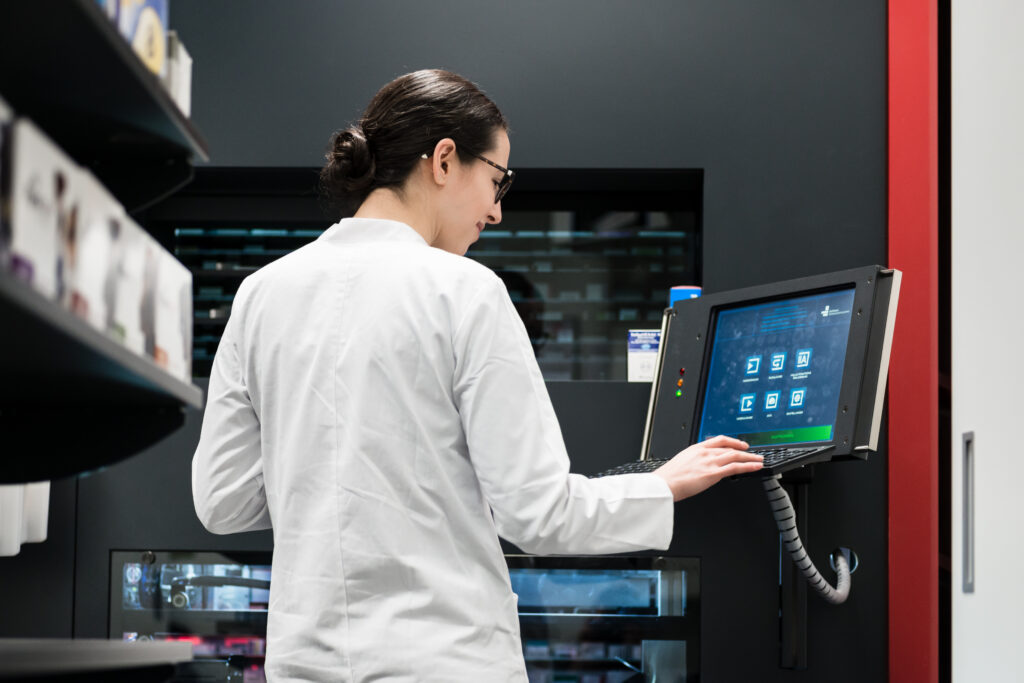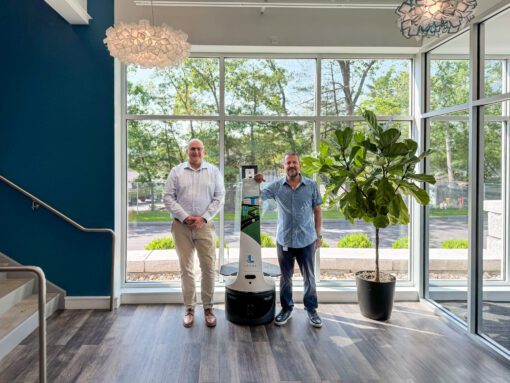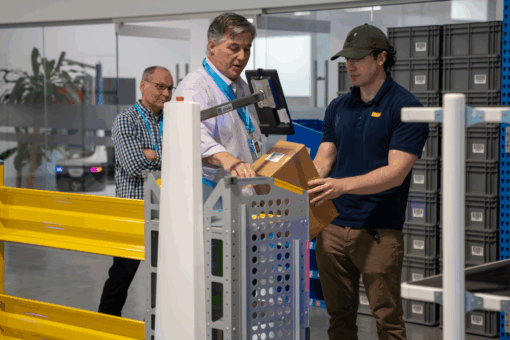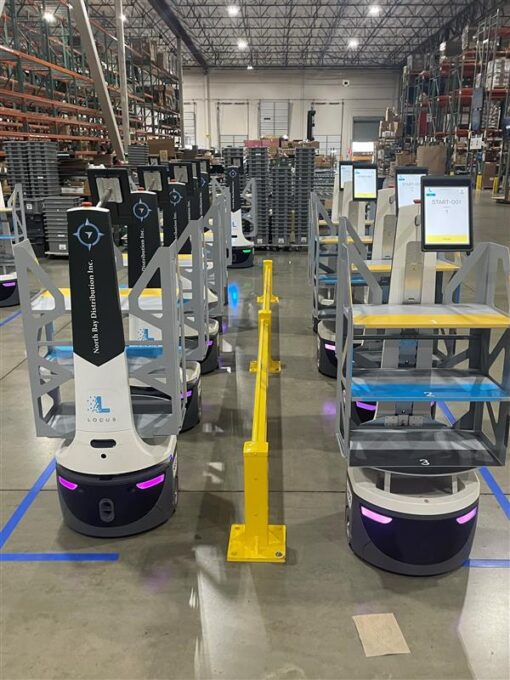WP: How to achieve 400 UPH with Locus Fast Pick
WP: How to achieve 400 UPH with Locus Fast Pick Download Now!
The Future of Pharmaceutical Logistics and Online Pharmacies
Mary Hart, Sr. Content Marketing Manager

In recent years, there has been constant change in how goods are moved and delivered, but few changes have been as impactful as the surge in e-commerce. As online shopping has steadily grown — now representing over 20% of total retail sales according to recent data from the U.S. Department of Commerce — the delivery of products to consumers' doorsteps has become increasingly seamless. However, there’s one sector that’s still in the early stages of automation: the pharmaceutical industry.
In a recent conversation with Guy Courtin, Vice President of Industry and Global Alliances at Tecsys Inc., on my podcast, Warehouse Automation Matters, we discussed how the rise of online pharmacies is changing logistics and what the future holds for this rapidly evolving market.
“Pharmacy is really a retail extension of healthcare,” Courtin explained. “If you and I need a prescription, that's a retail transaction.” Customers across all industries want convenience, speed, and privacy when it comes to their online orders. And much like e-commerce, the impact of online pharmacies on logistics is huge, introducing a series of new challenges for fulfillment companies.
The Convenience Factor
It's no secret that the pandemic changed consumer behavior in nearly every aspect of daily life. From working remotely to ordering groceries online, people have embraced the convenience of e-commerce like never before. This trend is evident in the pharmaceutical world as well. According to J.D. Power’s U.S. Pharmacy Study, more consumers are turning to mail-order services and opting to have their medications delivered rather than picking them up in-store.
“If I can get my groceries or sneakers delivered to my home, why not my prescriptions?” Courtin pointed out. This sentiment has been driving the rise of online pharmacies. Whether it's a hassle to visit a pharmacy in person, concerns about privacy, or the need for fast delivery of time-sensitive medications, online pharmacies offer a solution that’s increasingly attractive to consumers.
However, the convenience of receiving prescription medications at home comes with its own set of logistical challenges. Unlike traditional e-commerce, where a late delivery might mean frustration, the consequences of delayed pharmaceutical deliveries can be far more serious.
The Unique Challenges of Pharmaceutical Logistics
Sure, it sounds easy enough to deliver medicines just like anything else, but there’s a whole level of complexity that comes with pharmaceuticals over shoes or electronics. “When you're dealing with pharmaceuticals, you're introducing things like temperature control, expiration dates, and the need for signature upon delivery for certain narcotics,” Courtin explained. These factors complicate the already convoluted process of medical e-commerce.
One of the most critical factors in pharmaceutical deliveries is cold chain management, particularly for temperature-sensitive medications like insulin or biologics. “Cold chain management is massive,” Courtin said. He stressed that while it might be frustrating when things go wrong during a delivery of say frozen groceries, like ice cream, the stakes are far higher for medications. “If I fail to deliver your frozen medication properly, that’s a serious issue,” he added.
The complexity of cold chain logistics for pharmaceuticals is a challenge that the industry is still working to address. While grocery chains and e-commerce companies have made strides in delivering cold items, Courtin noted that “we haven’t fully solved the challenges of frozen delivery” for pharmaceuticals. Maintaining consistent temperature control throughout the entire journey — from warehouse to doorstep — is a tough task, and it’s one that logistics companies will need to continue working on.
Visibility and Track-and-Trace Systems
When it comes to delivering medications, ensuring that the right product gets to the right person safely can be a matter of life and death. This is where visibility and track-and-trace systems come into play. Pharmaceutical deliveries demand a high level of scrutiny, not only to ensure accuracy but also to meet regulatory requirements, which is especially important for narcotics and other controlled substances that require strict handling protocols.
“Track and trace is essential for pharmaceuticals,” Courtin explained. “It ensures that what you're receiving is what you should be getting, with full confidence in its safety and efficacy.”
With the rise of online pharmacies, logistics companies must adopt more sophisticated technologies to track medications from the point of origin to the end consumer. This requires real-time visibility into every step of the supply chain — something that’s still evolving for many companies in the space.
At Tecsys, Courtin's team focuses on providing customers with the visibility they need. “Our solutions help our customers coordinate last-mile delivery, ensuring timely and accurate shipments,” Guy said. The role of advanced tracking technologies, such as smart cameras and real-time monitoring systems, was also highlighted as key tools in ensuring the integrity and safety of pharmaceutical deliveries.
Regulatory Hurdles and Reverse Logistics
One of the most significant challenges that the rise of online pharmacies presents is the added complexity of regulatory compliance. In the pharmaceutical sector, strict regulations govern everything from how medications are stored to how they are transported, delivered, and returned. These regulations make online pharmaceutical logistics more complicated than that of traditional retail.
“When you’re dealing with medications, there’s an added layer of complexity due to privacy concerns and health regulations,” Courtin explained. The pharmaceutical supply chain needs to meet stringent requirements for tracking, maintaining the appropriate temperature, and ensuring that medications are not tampered with.
The returns process — also known as reverse logistics — is another area that presents unique challenges for the pharmaceutical industry. “Unlike regular retail returns, you can’t just drop medication in the mail,” Courtin pointed out. Narcotics and other controlled substances require careful handling during the returns process, and brick-and-mortar pharmacies like CVS or Walgreens may need to play a role in creating secure channels for the return of medications.
Drone Deliveries and AI
As the online pharmacy market grows, logistics companies will need to innovate to keep pace with demand. One of the more exciting possibilities that we discussed is the potential for drone delivery.
"We’ve already seen use cases for this in Germany, where drones deliver prescriptions to small islands,” Courtin said. Drones could be an ideal solution for delivering compact pharmaceutical packages over short distances, offering a fast and environmentally friendly way to handle last-mile deliveries.
But whether it's drone delivery, automated warehouses, or advanced AI-driven systems, the key to success in the online pharmacy sector will be a combination of technology, innovation, and precision. “We’re still beginning to fully understand the magnitude of these challenges, but we’re excited to tackle them head-on,” Courtin noted. As the industry continues to evolve, companies like Tecsys are at the forefront of developing solutions that address these unique challenges.
With the convenience of e-commerce now extending to healthcare, the demand for efficient, accurate, and compliant pharmaceutical deliveries will only increase. As Courtin emphasized throughout our conversation, the challenges are real, but so are the opportunities for innovation.
From cold chain management and track-and-trace systems to drone deliveries and AI-driven fulfillment, the future of pharmaceutical logistics is full of possibilities. And as the sector grows, logistics companies will need to adapt and embrace new technologies to meet the evolving needs of the market.
Curious to learn more about the rise of online pharmacies and their impact on logistics? Listen to the full episode of Warehouse Automation Matters to hear Guy Courtin’s insights and dive deeper into the conversation.




